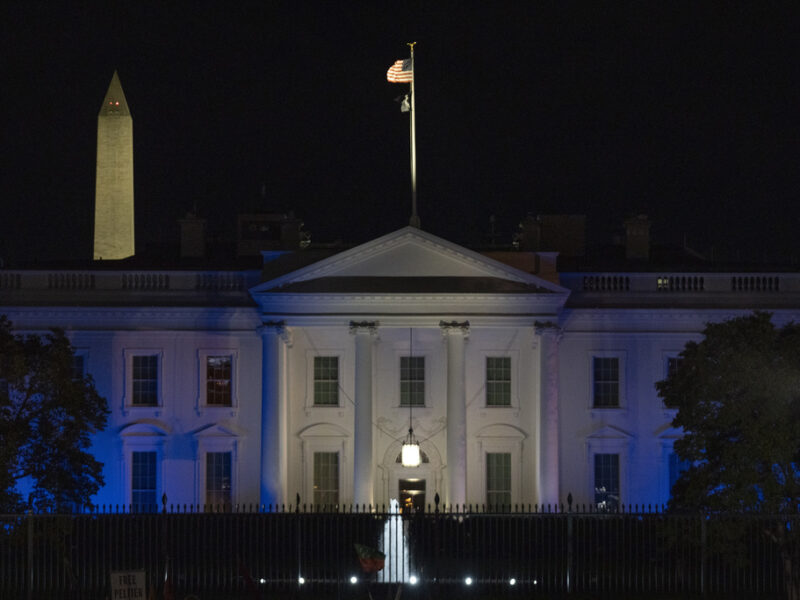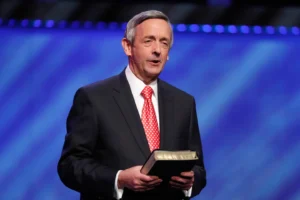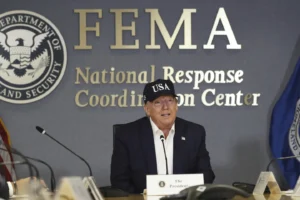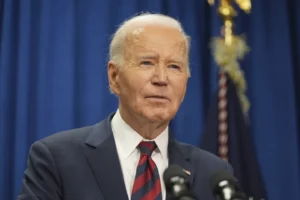International, Domestic Crises Raise Stakes for House Speaker Election
Absent permanent House leader, Congress unable to respond to violence in Middle East
- Published In: Politics
- Last Updated: Oct 11, 2023

The White House was illuminated blue and white, the colors of the Israeli flag, to underscore U.S. solidarity with Israel on Monday. (AP Photo/Jon Elswick)
By Jacob Gardenswartz
Special to the Wyoming Truth
WASHINGTON — The chaos which brought about the ouster of former U.S. House Speaker Kevin McCarthy (R-Calif.) last week was history-making in its own right. But the surprise outbreak of violence in the Middle East in recent days has brought about a truly unprecedented situation in Washington: a global catastrophe unfolding as the Congress is paralyzed, fully unable to respond.
Hamas’ Saturday morning offensive shocked both Israeli leaders and the world, representing among the most deadly spurts of violence in the Middle East in decades and a stunning intelligence failure for the West. In less than a week, over 1,000 Israelis and 900 Palestinians have been killed, with thousands more injured. The death toll on both sides is only expected to rise.
At least 14 Americans are among the dead, President Joe Biden said in remarks from the White House Tuesday, adding that some U.S. citizens had been taken hostage along with several hundred Israelis.
“This was an act of sheer evil,” Biden said. “We stand with Israel. And we will make sure Israel has what it needs to take care of its citizens, defend itself and respond to this attack.”
The situation has only raised the stakes for House Republicans’ ongoing debate over who will succeed McCarthy as their leader. Lawmakers met behind closed doors Tuesday night for a “candidate forum” where the two declared contenders — Majority Leader Steve Scalise (R-La.) and Judiciary Chairman Jim Jordan (R-Ohio) — argued their case.

But Republicans leaving the private meeting conceded to reporters that no candidate has yet appeared to consolidate the necessary support to win the election. So while the House could feasibly vote for a new speaker as early as Wednesday, the Washington consensus is that such an outcome is unlikely for at least a few days.
GOP leaders, meanwhile, seem intent on resolving their internal debates before bringing the matter up for a public vote — seeking to avoid the situation which befell Republicans in January, when it took a record 15 votes before the Californian the gavel.
“We went 15 rounds on the floor,” McCarthy recalled, speaking to reporters Tuesday night as his conference debated who would succeed him. “I think where the world is today, they shouldn’t come out of there until they decide that they have enough votes for whoever they bring to the floor can become speaker.”
He added he was declining to endorse a candidate, committing only to vote for whoever the GOP conference nominated.
Hageman all-in for Jordan; Cheney not so much
Rep. Harriet Hageman (R-Wyo.) — who aligns ideologically with many of the Republicans that ousted McCarthy, but opposed his removal — threw her weight behind Jordan, with whom she serves on the Judiciary Committee and select “weaponization” subcommittee.
“[Jordan] is absolutely a stalwart in staying on message and focusing on the issues that we need to focus on,” Hageman told the conservative outlet Breitbart in a podcast interview this weekend. Still, she added that she views Scalise highly, insisting she’s “optimistic that we’re going to get a very, very good speaker in place this next week.”
Former Rep. Liz Cheney, however, does not share her successor’s view.
“Jim Jordan knew more about what Donald Trump had planned for January 6 than any other member of the House of Representatives,” she said in remarks at the University of Minnesota over the weekend. “If the Republicans decide that Jim Jordan should be the Speaker of the House… there would no longer be any possible way to argue that a group of elected Republicans could be counted on to defend the Constitution.”
Hageman responded by suggesting Cheney just needs to “go away”: “It’s such an absurd statement. It also just demonstrates the shallowness of her analytical reasoning,” she argued.
But one area where the two are in alignment is Israel. Both have been highly critical of the Biden administration’s posture towards Iran, decrying the White House’s decision to unfreeze $6 billion in Iranian funds last month in exchange for the release of American prisoners.
And while some Republicans have floated the idea of reinstating McCarthy as speaker given the need for stability amid this foreign crisis, Hageman appeared less than keen.
“I think that Kevin McCarthy was a good speaker, but that’s in the past. Now we have to move on,” she added on the podcast.
What comes next?
As Republicans work to find consensus behind a speaker candidate, the fate of the U.S. government — and the global order more broadly — hangs in the balance.
Though the White House has yet to formally request additional funding to provide the Israeli military greater support, U.S. officials have said such an ask may come soon. Without a permanent House Speaker, though, lawmakers are unable to appropriate funding.
Even something as non-controversial as the bipartisan resolution condemning Hamas and expressing support for Israel — a motion Hageman has signed, alongside 389 of her House colleagues — is unable to be voted on until a speaker is elected.
“We have a job to do something right now,” McCarthy told reporters Tuesday . “There is a crisis in the world. There’s a void of leadership.”
On the domestic front, there’s also the issue of government funding; appropriations from the short-term stopgap measure are set to expire on Nov. 17. Some lawmakers leaving the Tuesday-night meeting suggested another extension may be necessary.
But if neither speaker candidate is able to convince his colleagues to support him, there is a possible third option: maintaining the status quo.
A 9/11-era law passed to ensure continuity of government in times of crisis enabled the House Speaker to name an interim successor, in this case Rep. Patrick McHenry (R-N.C.). But how much power that person wields remains an open question. Some experts have argued he can do little more than preside over the election for the new, permanent speaker.
But others believe McHenry should be empowered to act as any speaker would, particularly in moments of global crisis. How and whether he tries to flex his powers could have implications not only for the current moment but for American history moving forward.
“You want the continuity of government,” McCarthy said Tuesday. “That’s why we created that. That’s why I named him, and he should be able to do the job.”













